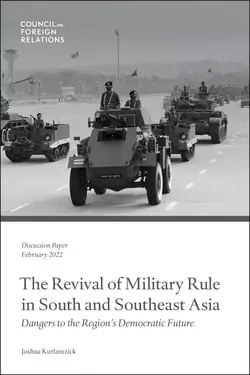
The Revival of Military Rule in South and Southeast Asia
Dangers to the Region's Democratic Future

The rise in coups and other types of military intervention in South and Southeast Asia will set back democracy by years and has been met by a weak and ineffective response from major global and regional powers.
- Report
In the 2000s and early 2010s, South and Southeast Asia made significant democratic progress. Countries including Bangladesh, Indonesia, the Philippines, Sri Lanka, Thailand, and Timor-Leste became solid democracies or made transitions in that direction. But in the past decade, South and Southeast Asia have suffered some of the sharpest democratic regressions of any regions.
No one factor has caused South and Southeast Asia's democratic regression, part of a broader global trend of fifteen years of democratic rollback, as the recent coup in Burkina Faso attests. The rise of illiberal populism in South and Southeast Asia has resulted in the election of leaders such as Philippine President Rodrigo Duterte and the subsequent corrosion of democratic institutions and norms. The novel coronavirus pandemic has been a boon to illiberal leaders in the region—and around the world. The exponential growth of social media also has contributed to spreading disinformation and exacerbating polarization.
More on:
Yet throughout South and Southeast Asia, the revival (or in some places the continuance) of military meddling in civilian governance has become a factor in democracy's retreat. Just ten years ago, no militaries were fully in control of governments in South or Southeast Asia, and it appeared that civilians would gain greater command of armies even in places where the military still wielded significant domestic influence. Today, two armies, in Myanmar and Thailand, are in direct or de facto control of countries. In states such as Cambodia, Indonesia, Pakistan, and the Philippines, armed forces play growing—even dominant—roles in politics again. This regional trend was capped in February 2021, when the Myanmar armed forces seized power. Yet that coup was only the most visible sign of a revival of military political power in the region.
This military revival, like the broader global democratic regression, is part of an international trend. Around the world, more coups were attempted in 2021 than in the prior five years combined. Yet the resurgence of military political power is particularly notable in Southeast Asia, because many Southeast Asian states had previously advanced toward becoming consolidated democracies.
The effects of renewed military meddling on democracies, societies, and economies often are devastating. They tend to make it hard for countries to return to democracy, spark significant bloodshed, and create governments that are terrible at ruling or lead to failed states like Myanmar today. They also potentially spark coups in neighboring states and hurt democratization within an entire region. Indeed, military takeovers often lead to sizable and immediate rises in state violence. They also tend to result in an entrenchment of harsher authoritarian rule than what emerges under illiberal populists. Moreover, while some illiberal populist governments have promulgated significant public policy reforms—Thailand's early 2000s populist government oversaw groundbreaking new social welfare programs, for instance—nearly all military regimes have proven incompetent at governing and often prioritize self-enrichment. Overall, the return of military involvement in governing in the region will set back democracy by years, foster violence, and likely impede development. Worse, coups and other military involvement have been met by a weak and ineffective response from major global and regional powers.
This paper was made possible by the generous support of the Henry Luce Foundation.
Read this report in Thai / อ่านรายงานนี้ในภาษาไทย
More on:
Professors: To request an exam copy, contact [email protected]. Please include your university and course name.
 Online Store
Online Store